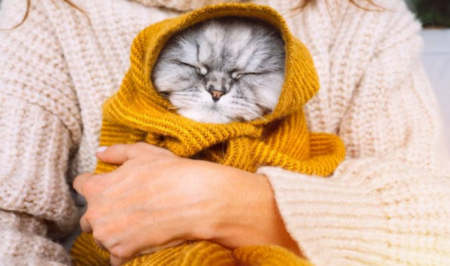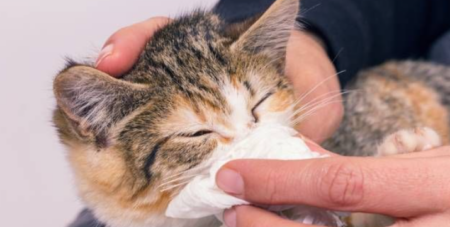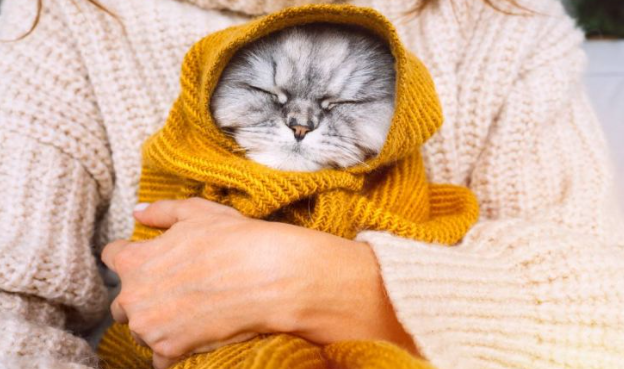Discover if cats get cold inside the house. Learn how to keep your feline friend warm and cozy during the colder months.Do cats feel cold? Yes, and more than humans. Cats are incredibly resilient creatures, and they have evolved to withstand various climates. Their bodies are adept at maintaining a comfortable core temperature, even in colder conditions. Cats have a higher resting metabolic rate compared to humans, meaning they generate and retain heat more efficiently.
Do Cats Get Cold Inside The House.

Yes, cats can get cold inside the house, especially during the colder months or if the indoor environment is not adequately heated. Cats are warm-blooded animals, and they do have fur to help keep them warm, but domestic cats are not as well-equipped for cold temperatures as some of their wild relatives.
Factors that can contribute to a cat feeling cold inside the house include:
- Low Indoor Temperatures: If the temperature inside the house drops too low, cats can feel cold, just like humans. Cats are most comfortable in temperatures ranging from about 70°F to 100°F (21°C to 38°C). When the indoor temperature falls below this range, especially during winter, cats may seek out warmer spots, like sunny windowsills or heated pet beds.
- Lack of Insulation: Short-haired or hairless breeds, such as Sphynx cats, have less natural insulation against the cold and may feel colder quicker than their long-haired counterparts.
- Age and Health: Older cats, very young kittens, or cats with certain health conditions may have a harder time regulating their body temperature and thus may feel cold more easily.
- Inactivity: Cats that are less active, especially indoor cats, might get cold more easily because they’re not generating as much body heat through movement.
To help your cat stay warm, consider providing a warm and cozy sleeping area, using pet-safe heated beds, keeping your home at a comfortable temperature, and ensuring that there are plenty of warm spots for your cat to curl up in. Also, be attentive to your cat’s behavior; if they’re seeking out heat sources more than usual or showing signs of discomfort, it might be an indication that they’re feeling cold.
DO CATS FEEL COLD;Do Cats Get Cold Inside The House.

Cats have a reputation for resisting inclement weather, especially wild cats. But what about domestic cats? The short answer is yes, cats can feel cold , although not in the same way as humans. Unlike us, felines have fur that acts as a natural insulator against extreme temperatures. Their thick fur coat provides them with a shield against cold and heat. In addition, the subcutaneous fat they have helps them maintain their body temperature.
However, not all cat breeds are the same. Those with short hair, such as the Siamese or the Abyssinian , are more susceptible to low temperatures . Also hairless cat breeds , such as the sphynx. And their lack of hair does not provide them with the same protection as long-haired cats, such as the Persian or the Maine Coon . Therefore, it is important to take into account the breed and individual characteristics of the cat to determine if it feels cold.
- Another factor to consider is the age of the animal . Kittens and older cats are more vulnerable to the cold due to their less developed or weakened immune systems. And for this reason, it is crucial to provide them with the shelter they need during the winter.
- Your cat’s behavior can also tell you if it feels cold. See if he looks for warm, cozy places, such as radiators, blankets, or your lap. If you notice your cat curling up or seeking shelter in unusual places, it’s a sign that he might be getting cold.
- Physical signs can also indicate that your cat is suffering from the cold. Tremors, prickly fur, and decreased activity are clear signs that your feline might need extra warmth.
HOW TO PROTECT CATS FROM THE COLD
In order for domestic cats to remain protected from the cold when winter arrives, several measures must be taken. The most important thing is to provide them with a warm and cozy place within the home. A soft and fluffy bed, with several blankets and away from drafts, will be more than welcome. It is also important that the house is at a comfortable temperature, avoiding sudden fluctuations in heat and cold.
- A word of advice: a programmable thermostat is best for maintaining a stable and comfortable environment for the entire family, including cats.
If your cat is cold and you want to know how to protect it, we give you some tips for your pet:
- Leave a couple of comfortable blankets at home in strategic areas so your pet can cover themselves and rest. This is a smart and economical solution to keep the animal warm while you are not at home, don’t worry, your cat will know how to find them and cover themselves with them. If you have a Sphynx cat or a breed with very little hair, it is recommended that you cover its back with some special piece of clothing for felines, this way it will be adequately protected and warm.
- When you are at home you can turn on the heating and make the temperature of your home much more pleasant, your cat will thank you. Also, if you see that your animal decides to lie down and rest on a radiator , don’t be scared, cats can withstand up to 50ºC on their skin, which is why on winter days they enjoy resting on warm surfaces. Of course, when you are going to leave the house alone for a long time, it is advisable to turn off the heating, this way you will avoid possible accidents with your pet and the heat.
- Also condition your bed with a good quilt that helps isolate the cold from the ground and with a blanket that keeps you warm at night. This way you also prevent your pet from catching a cold or suffering from the impact of low temperatures on its health.
- At home, it’s helpful to keep the windows tightly closed to make sure no drafts get in while you’re trying to stay warm. Knowing how to insulate your house from the cold is important to keep your cat warm and comfortable.
Conclusion
So, do cats get cold inside the house? While cats have natural mechanisms to regulate their body temperature, they can still feel the effects of extreme cold. By providing a warm and cozy environment, you can help ensure your feline friend stays comfortable throughout the colder months. Remember to keep an eye out for signs of discomfort and take appropriate measures to keep your cat warm and safe.
